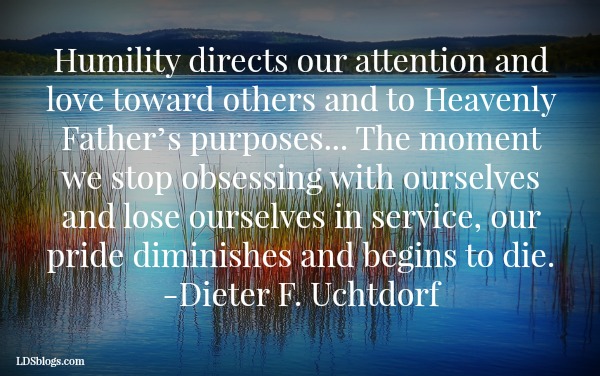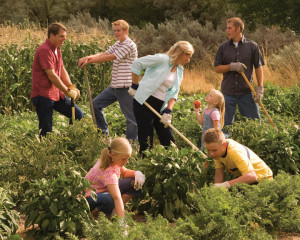Humility is not thinking less of yourself, it’s thinking of yourself less. —C. S. Lewis
Some people seem to think that being humble means to let others walk all over you. That is simply not true. Being humble is to be teachable. People who let others walk all over them usually have a problem with self-esteem. Humble people just know they have a lot to learn and are eager to begin the process.
Submissive
 To be humble is to be submissive to God’s will. God’s will is never for us to be neglected or abused by anyone. Heavenly Father is kind and loving. He may not always answer our prayers in the manner that we expect or want at the time, but He does answer our prayers for our good. Humility is understanding that Heavenly Father has our back for the ultimate good, and being submissive to the fact that we may have to wait for certain blessings to be fulfilled.
To be humble is to be submissive to God’s will. God’s will is never for us to be neglected or abused by anyone. Heavenly Father is kind and loving. He may not always answer our prayers in the manner that we expect or want at the time, but He does answer our prayers for our good. Humility is understanding that Heavenly Father has our back for the ultimate good, and being submissive to the fact that we may have to wait for certain blessings to be fulfilled.
It bears repeating that to be submissive does not mean to submit to neglect or abuse.
Some may wonder if those seeking to become humble must forever defer to the strongly held opinions and positions of others. Certainly the Savior’s life evidences that true humility is anything but subservience, weakness, or servility (Marlin K. Jensen, “To Walk Humbly with Thy God,” Apr. 2001 General Conference).
Love versus Pride
One can’t be humble without great love for others. Love is unselfish. Being humble means being willing to forego your desires unselfishly for the betterment of someone else.
Some suppose that humility is about beating ourselves up. Humility does not mean convincing ourselves that we are worthless, meaningless, or of little value. Nor does it mean denying or withholding the talents God has given us. . . . Humility directs our attention and love toward others and to Heavenly Father’s purposes. Pride does the opposite. Pride draws its energy and strength from the deep wells of selfishness. The moment we stop obsessing with ourselves and lose ourselves in service, our pride diminishes and begins to die (Dieter F. Uchtdorf, “Pride and the Priesthood,” Oct. 2010 General Conference).
Gratitude and Service
 One cannot be humble without being grateful. The most humble person I have ever met is constantly serving others. He serves his wife, children, extended family, neighbors, community—everyone he meets. He has an incredible amount of love to give, which leads to service, which leads to gratitude and humility. I have watched as this man has served the elderly with tenderness and love. While Hospice takes care of medical needs, this man provides true friendship. One elderly gentleman could no longer venture to his front door to collect the morning newspaper from the top of his wheelchair ramp. This humble servant of the Lord drove over to the man’s house every day for months, collected the newspaper, and took it inside for his friend. Death does not even break the bonds of service, as this man dutifully decorates the graves of many friends on a regular basis in cemeteries scattered over many miles.
One cannot be humble without being grateful. The most humble person I have ever met is constantly serving others. He serves his wife, children, extended family, neighbors, community—everyone he meets. He has an incredible amount of love to give, which leads to service, which leads to gratitude and humility. I have watched as this man has served the elderly with tenderness and love. While Hospice takes care of medical needs, this man provides true friendship. One elderly gentleman could no longer venture to his front door to collect the morning newspaper from the top of his wheelchair ramp. This humble servant of the Lord drove over to the man’s house every day for months, collected the newspaper, and took it inside for his friend. Death does not even break the bonds of service, as this man dutifully decorates the graves of many friends on a regular basis in cemeteries scattered over many miles.
Service to others makes us grateful to our Heavenly Father for our own blessings, and gratitude turns into humility.
As I have pondered these faithful members, I am struck by two qualities they all seem to have. First, regardless of social or economic status or position, their humility leads to submissiveness to the Lord’s will. And second, in spite of the difficulties and trials of life, they are able to maintain a sense of gratitude for God’s blessings and life’s goodness. Humility and gratitude are truly the twin characteristics of happiness (Richard C. Edgley, “The Empowerment of Humility,” Oct. 2003 General Conference).
Pain Teaches Humility
 Humility is often learned by experiencing pain, whether physical, emotional, or spiritual. None of us come through mortal existence without experiencing adversity. How we handle our trials is what is important. Doesn’t it make sense to turn our inevitable troubles into something good?
Humility is often learned by experiencing pain, whether physical, emotional, or spiritual. None of us come through mortal existence without experiencing adversity. How we handle our trials is what is important. Doesn’t it make sense to turn our inevitable troubles into something good?
I’m sure, like me, you know someone who complains constantly about every bad day in life. Sometimes we all need to vent, so I’m not talking about the occasional complainer; I’m talking about the chronic doomsday sayer. Nothing is ever good enough, bright enough, or happy enough for this person. If given a bonus of $1,000, he would complain it wasn’t $2,000. If rain comes after a long drought, she would complain the rain frizzes her hair. If her husband does the dishes, she will complain that he didn’t take out the garbage. If his wife organizes the kitchen cupboards, he will complain she didn’t give the dog a bath. You know this person. Don’t you want to say, “Hey, get a grip?!” If the chronic complainer were to turn complaints into service for others, his/her heart would change, gratitude would come, and so would humility.
Now consider the most humble person you know. Do you know this person’s life trials? What adversity has this person overcome? Sometimes the most humble people are those who have come through huge trials.
Pain brings you to a humility that allows you to ponder. It is an experience I am grateful to have endured (Robert D. Hales, “Healing Soul and Body,” Oct. 1998 General Conference).
Conclusion
Humility is the art of thinking unselfishly about others, giving service, expressing constant gratitude, and being submissive to Heavenly Father’s will. It is being teachable. Humility is the opposite of prideful. Humble people are those who turn their adversity into good works. C. S. Lewis put it quite nicely that it is thinking of yourself less.
Tudie Rose is a mother of four and grandmother of ten in Sacramento, California. You can find her on Twitter as @TudieRose. She blogs as Tudie Rose at http://potrackrose.wordpress.com. She has written articles for Familius. You will find a Tudie Rose essay in Lessons from My Parents, Michele Robbins, Familius 2013, at http://www.familius.com/lessons-from-my-parents.






